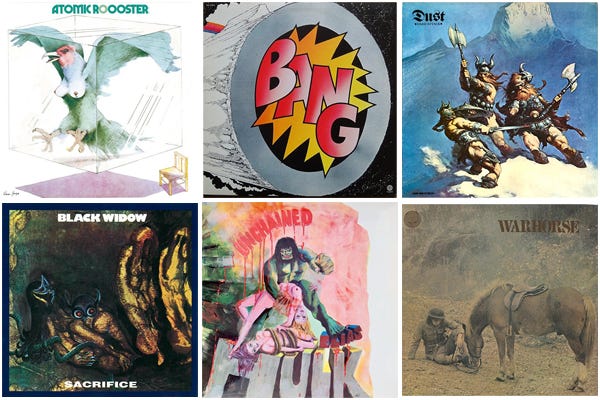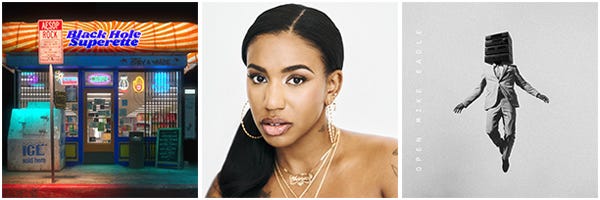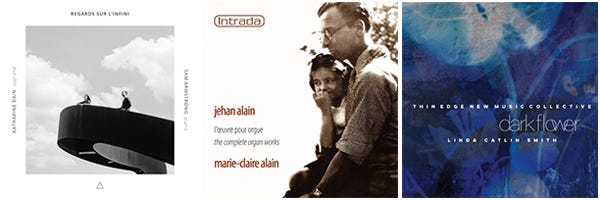New on Shfl, July 2025
Rick Anderson on Baroque Music, Harold Heath on Leon Sylvers III, Joe Muggs on Basic Channel, Jeff Treppel on Proto-Metal, plus a healthy batch of new recommendations
Rick Anderson on Baroque Music
The word literally means “overly fancy,” and its original use reflects the conventional wisdom of the European musical establishment at that time: coming out of the Renaissance period, when art music was mostly somber church music and mostly vocal, the efflorescence of virtuosic, highly ornamented, and increasingly secular music during the 17th century seemed to many like an abandonment of cherished norms and values in favor of outlandish and decadent virtuosity.
Collections
Harold Heath on Leon Sylvers III's Production Hot Streak
Singer, songwriter, producer, multi-instrumentalist and DJ Leon Sylvers III wrote his first hit for family soul band The Sylvers in 1972, and had already clocked up an impressive music industry career when he left the group in ’78 to take up the role of in-house producer at the newly created SOLAR label. His influential production work through the first half of the ‘80s delivered massive singles and albums for Shalamar, The Whispers, his own vehicle Dynasty, Carrie Lucas, Evelyn Champagne King, Tavares, Midnight Star and more, as well as neatly charting the emergence of the classic mid-80s electro-soul sound from the ashes of disco.
Joe Muggs on Basic Channel
There are few act names more appropriate than “Basic Channel.” From the moment they first connected in the early 90s, Mark Ernestus and Moritz Von Oswald were dedicated to reducing grooves to their simplest essences.
Jeff Treppel on Proto-Metal
Proto-metal bands represent the Autumn of Disillusionment to psych rock’s Summer of Love, all the young sixties idealists waking up from their acid trips with wicked hangovers and treatment-resistant VDs. As Blue Öyster Cult said in “This Ain’t The Summer of Love,” their cynical kiss-off to the Woodstock generation: “This ain’t the Garden of Eden / And there ain’t no heaven above / Things ain’t what they used to be / And this ain’t the Summer of Love.” Even the Beatles went from “I Wanna Hold Your Hand” to “Helter Skelter.”
Reviews
Nate Patrin
Open Mike Eagle — Neighborhood Gods Unlimited
At this point, approaching his second full decade of releasing records, he’s honed such a formidable thematic blend of comedy and pathos that he’s earned a place beside the few other MCs that have nailed it quite so playfully — the turf of Pharcyde, De La Soul, and DOOM is his to roam.
Aesop Rock — Black Hole Superette
Aesop Rock’s detail-heavy observations from a left-field perspective have always been a creative strength, being one of the main reasons his intricate verbiage is always worth rewinding even when it seems impenetrable. And one of the reasons his discography is one of the most overwhelmingly and consistently rewarding of the last 25 years of hip-hop is that he’s been able to express himself in a perspective where he’s less voice of god than weathered traveler.
Yaya Bey — Do It Afraid
Sometimes all you need is a familiar sentiment delivered in such a breezily pretty way that it reminds you why that sentiment’s familiar in the first place. Yaya Bey’s artistry is given to taking a direct and clear statement and instilling the deepest possible emotional weight to it, and the spirit of do it afraid is dedicated to making sure that weight’s inverted into the antigravity of joy.
Amelia Riggs
Dragging an Ox Through Water — Panic Sentry
Much hay can be made from delving into weird terms like “folktronica” or “freak folk” or anything that doesn’t immediately fall into “acoustic guitar is being played.” The goal with pushing folk music into its nth degree is to play with limits, to futz with tradition, and often times to unsettle the coffee shop Sunday morning playlist makers.
Bill Orcutt — The Four Louies
When Bill Orcutt isn’t mutilating the guitar into something primal and ecstatic and new, he indulges the side of his musical brain that is both encyclopedia and trickster. On paper The Four Louies is preposterous; sampling, looping, tweaking, and melting together Steve Reich’s Four Organs and The Kingsmen’s legendary protopunk “Louie Louie.”
Babatunde Adebimpe — Thee Black Boltz
While his iconic vocals — often looping and layering and prone to soaring falsetto — hit a nostalgic button in the corner of the brain, the arrangements are lusher and more surprising than “the TVOTR guy’s solo album” would have you assume.
Andy Beta
Mark Ernestus' Ndagga Rhythm Force — Khadim
Ernestus’s name rests at the top of the third Ndagga Rhythm Force record, his exploration of the collision between dub techno and Senegal mbalax, but he naturally prefers a cover visual of rusted metal and old tires with a photo collage of his collaborators on the back, the man himself nowhere to be seen.
La Torre Ibiza [Volumen Cinco]
Balearic compilations used to be an annual tradition, somewhere between precious remembrances of temps perdu at DJ Alfredo’s Amnesia or Jose Padilla’s Cafe del Mar and Ibiza Airport gift shop souvenir. Modern Balearic master Mark Barrott and Pete Gooding’s fifth entry in the Hostal Torre’s La Torre Ibiza series also celebrates a decade of their own modern spin on the form.
Charles Bals — Ambientale
French collector Charles Bals earns his Euros as a creative director, but in underground music circles, he’s renowned for turning up the most baffling and un-genre-able of curios, as evinced on the beach-friendly Balearic comp Club Meduse and the loner ‘70s motel folk of America Dream Reserve.
Hank Shteamer
Deftones — Diamond Eyes
Written and recorded during a dark chapter for Deftones, when early-era bassist Chi Cheng was in a coma due to injuries sustained in a car accident, Diamond Eyes turned into an unlikely mid-career peak.
40 Watt Sun — Perfect Light
The first two full-lengths by 40 Watt Sun — essentially the solo vehicle of Patrick Walker, the U.K. singer-songwriter known previously for his work in the doom-metal band Warning — found the trappings of conventional heaviness gradually draining away. By the time of this third LP, the project bore little sonic resemblance to Walker’s prior outfit, beloved in the underground for the almost alarming despondency of its second album, 2006’s Watching From a Distance.
Deadguy — Fixation on a Co-Worker
The record feels like a nervous breakdown in progress — enraged, damaged and thoroughly disturbed — placing it in league with contemporary work from hardcore-adjacent mad scientists such as Dazzling Killmen and Craw.
Megan Iacobini de Fazio
Abagwagwa, Lagoss — Island Slang
Now based in Tenerife, Cardoso and his group Lagoss use the island’s relative isolation not as a limitation but as a catalyst to construct strange, fantastic sonic ecosystems. Island Slang continues that vision, in collaboration with Ugandan group Abagwagwa (aka Nihiloxica of Nyege Nyege fame).
Sami Galbi — Ylh Bye Bye
Sami Galbi’s debut Ylh Bye Bye is a heady collision of Maghrebi pop melodies, club-ready grit, and all the communal abandon of a North African street party.
Africa Express Presents... Bahidorá
But ever since its inception in 2006, when founder Damon Albarn and other major European artists travelled to Mali with the likes of Toumani Diabaté, Bassekou Kouyaté and Amadou & Mariam, Africa Express has built something far more organic: there’s no sense of Western musicians playing the role of tastemaker, sounds aren’t stripped of context or repackaged for western palatability.
Sean Wood
Thin Edge New Music Collective — Linda Catlin Smith: Dark Flower
“Unbroken, for Howard Skempton” is the highlight of this pensive, angular collection of instrumental pieces. It consists of a simple series of piano chords that magnetize one’s attention but evade capture, creating a sense of suspension in alternate realms of time and harmony. Smith’s music manages to be both austere and warm at once.
Marie-Claire Alain — Alain: L'oeuvre pour orgue
French musician Jéhan Alain was one of the many musical talents extinguished prematurely by the World Wars, killed at the Battle of Saumur in 1940 at the age of 29. He’s known for his organ music, both intensely colorful and intensely contemplative.
Katharine Dain, Sam Armstrong — Regards sur l'Infini
This set of twentieth-century French songs contains one of the best performances on record of “Dors,” part of the song cycle L’âme en bourgeon (“The Budding Soul”) by Claire Delbos. Delbos, known primarily as the first wife of Olivier Messiaen, led a difficult life whose story has typically been overshadowed by that of her famous husband.











